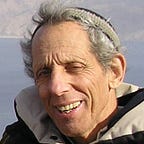Why I Quit Journalism 40 Years Ago
“All the news that’s fit to print” has changed to ”print all the news that fits an agenda.”
The Place: Edmonton, Alberta
The Year: 1981
The Edmonton Daily Journal, at the time Canada’s largest newspaper, hired me as ‘senior copy editor,” a fancy title with a fat salary for five people who decide whether a news item goes into the trash can or in the newspaper.
I was 37 years old, a graduate of The George Washington University School of Journalism with a resume of several years as an investigative reporter and editor for various small-town and large metropolitan dailies and weeklies in Virginia and Canada.
Six weeks after I started work at the Journal with a salary I never dreamed of and haven’t seen since, I walked in one morning and told the executive editor, ”I quit.” He was stunned and asked why. I didn’t even bother answering. He would not have understood.
Until that day, journalism was my religion. Years before, I already had traded Judaism for journalism, believing that investigative reporting on the ills of society was the path to truth, or what today is popularly and incorrectly termed “tikun olam,” a Hebrew term that literally means “fixing the world.”
After six troubling weeks as a senior copy editor, my illusion was shattered. The short answer to my boss’s question was, “This is not news. This is a lie.” The long answer is that once an opinion on one news item becomes accepted as a fact, it only is matter of time until all the news becomes an opinion.
In a twist of The New York Times slogan “All the news that’s fit to print,” journalism has evolved into a profession that ”prints all the news that fits an agenda.”
In 1981, the big headlined news was the Israeli-Lebanon War, which I never had heard of before starting work because I had totally disconnected from news, society, family and my Jewish religion for several years while working as an itinerant worker and fruit picker.
I grew up in a relatively observant Jewish family in Baltimore. My father, may his memory be for a blessed memory, and I walked a mile and half back and forth to synagogue three times every Shabbat. We kept kosher at home.
I studied at a public school and learned in Hebrew school in the late afternoon twice a week and on Sunday morning. Israel was only 10 years old at the time, and the Hebrew school’s concern was that children should learn Torah and Jewish law lest we become assimilated. Zionism was never mentioned and certainly not encouraged because of its predominantly secular population.
I absorbed the message very well. When my parents returned from their first trip to Israel in 1960, I refused took at photographs they had taken because Israel was not a religious state.
I mention all of this as a background to what happened during those six weeks at the Journal. I was totally detached from Judaism. I certainly was not a Zionist. I was a journalist and nothing else.
One of my responsibilities as a senior copy editor was to read the news from the wire services and decide whether it was interesting and worthy enough to appeal to the readers. That is how I discovered that there was a war in Lebanon.
Every day, I read the UPI and AP reports of Israel being an aggressor, attacking Lebanon and killing ”freedom fighters.” The headlines, which I and my colleagues wrote, were based on the first paragraphs of the wire copy.
It was not until the 11th paragraph that the overseas reporters added that Lebanese “freedom fighters” and “guerillas” earlier in the day had fired rockets into northern Israel villages and farms, wounding and killing citizens.
Day after day, I read the same reports, and thought, ”This doesn’t make sense. Why are reporters describing Israel as an aggressor for 10 paragraphs before even mentioning that the Israel Defense Forces retaliated out of self-defense? Lebanon, not Israel, is the aggressor, but the news reports convey the opposite.”
My idol of journalism was shattered like the Golden Calf. Journalism no longer was my religion. That is why the next day, I told the boss, ”I quit.”
I didn’t realize at the time that almost every wire service and senior journalist, without recourse, published their own prejudicial and slanted view of Israel. It is a phenomenon that has infected virtually every area of the news, whether it is Trump, Biden, the climate, Iran, Covid, immigration, Big Tech or race.
My disillusionment preceded by more than 30 years recent revelations by former Associated Press reporter Matti Friedman how the news is rigged against Israel.
Writing in the May 2021 edition of the journal Sapir, Mr. Friedman commented that journalists “see their job not as helping you understand events, but as pushing you toward their conclusions. They engineer their reporting to that end…. a character assassination that will stoke anger and punish the guilty party.”
The built-in presumption that Israel is guilty explains why most media judged Israel as the villain in the wars initiated by Hamas. It explains why the media presumed Israel to be the aggressor in the war in Lebanon in the 1980s.
And it explains why I walked away from a highly-paid position that promoted hatred against Israel.
